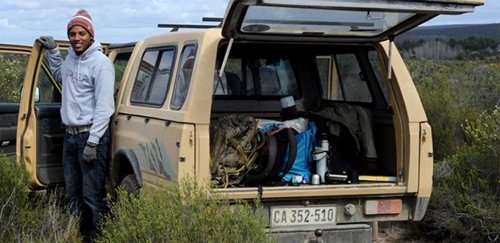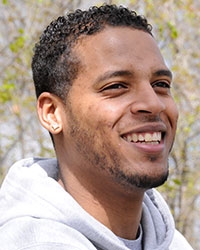Secret Life of Plants Leads Student to Field of Research
- News & Events
- News
- Secret Life of Plants Leads Student to Field of Research

RIC biology major Bruno Ramos on a research expedition in South Africa.

Biology major Bruno Ramos ’15 discovered the field of research by focusing on an area of biology he disliked most – the study of plants.
“My intention is to go into the medical field,” Ramos said. “So, whenever the study of plants came up in my intro to biology courses, I couldn’t understand how it was relevant to me.”
But when the future doctor became a recipient of a STEM scholarship in the spring of 2012, he decided to challenge his own bias and find out if he could possibly be wrong about plants.
The STEM scholarship required Ramos to conduct research in the lab of a faculty member. So, while stationed in Afghanistan for a semester as a member of Air National Guard’s engineer squadron, Ramos emailed RIC Associate Professor of Biology Roland de Gouvenain whose research involves field studies in plant evolutionary ecology.
de Gouvenain accepted Ramos’ request to study in his lab, and upon Ramos’ return to RIC de Gouvenain had him spend the first semester reading up on literature about plant ecology. “He wanted me to read as much as possible so I’d be well informed and to develop questions from the literature that I could potentially pursue for my own research,” Ramos said.
Integrating reading and fieldwork in de Gouvenain’s Forest Ecology Lab at Yale sparked an interest in plants that Ramos hadn’t had previously. He would soon formulate a question that would lead to his honors thesis.
“In the literature, I noticed that studies would compare the traits between two species of plants, taking the mean value of the trait in one species and comparing it to the mean value of the trait in another species, which generated a question in my mind,” Ramos said. “These studies were looking at the variations between species but ignoring a lot of the variations that exist within a single species.”
Ramos decided to make this the focus of his research when he and de Gouvenain flew to one of the most biodiverse hotspots in the world – South Africa – in the summer of 2014. There they joined a larger research team of experts in ecology, evolution and genetics from the University of Connecticut, the University of California-Davis, Yale University and the University of Cape Town, South Africa.
While working with the team, Ramos conducted his individual research, examining the differences in a single species based on variations in their environmental conditions.
Working with a local botanist, Ramos selected four species for study: Ruschia indurata, Aridaria nodiflorum, Chrysocoma ciliata and Diospyros austro-africana, observing the same species at various sites that differed in annual rainfall and temperature.
“My study focused on the intraspecific variability in their leaf traits,” he explained. “The first three species showed a lot of leaf variation. At a particular site you might see huge leaves and in another site not so huge. The last species, Diospyros austro-africana, had little variation. I was able to show, through my results, the great amount of variability within a species and that leaf traits exhibited by the focal species may vary depending on which sites they were found, suggesting some influence of temperature and rainfall.”
Ramos added that “intraspecific variability is an overlooked and under-investigated driving force behind biodiversity. It accounts for much of the variability in nature and should be taken into account when investigating biodiversity and community assembly processes.”
Ramos presented his findings at a RIC poster session attended by faculty, administrators and students and is working on publishing his findings in a specialty journal.
Another outcome of his research in plant ecology, Ramos said, was a newfound interest in medical research.
He said, “Working with Professor de Gouvenain taught me not to dismiss things that I haven’t given proper study to. It also expanded my horizons. I still intend to pursue medicine but I’m also considering medical research.”
Since graduating this May, Ramos has been preparing for the MCAT exam before he applies to medical schools in the fall.
